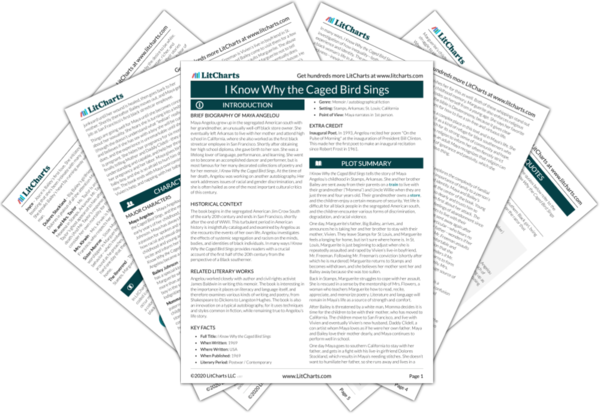This memoir is also an account of how sex and gender influence experience and identity. Marguerite recognizes that being a girl is a kind of disadvantage, and wishes occasionally that she had been born a boy. The novels she reads have men and boys as their heroes and protagonists, so she believes that to be a hero one must be male. Marguerite also feels pressure to be feminine and attractive, and is tormented by her own “ugliness” for much of her childhood.
Marguerite’s rape at the hands of Mr. Freeman—and her struggle to recover, both physically and emotionally—are at the center of a discussion about sex, gender, and violence. Marguerite feels guilty and responsible for her own rape. She had been told by her grandmother to always “keep her legs closed” and she believes her rape is evidence of her own promiscuity. Her relationship with sex and sexuality are complicated by this event, and the text is an account of how she learns to navigate her own sexuality after being victimized.
In many ways, I Know Why the Caged Bird Sings is an investigation of how inequality—both racial and sexual—shape experience and identity. The memoir records the experience of a black woman’s life in America, and her womanhood—like her blackness—inevitably shapes and informs her experience.
Sex, Gender and Sexuality ThemeTracker

Sex, Gender and Sexuality Quotes in I Know Why the Caged Bird Sings
If growing up is painful for the Southern Black girl, being aware of her displacement is the rust on the razor that threatens the throat.
When I was described by our playmates as being shit color, he was lauded for his velvet-black skin…And yet he loved me.
He held me so softly I wished he wouldn’t ever let me go. I felt at home.
The Black woman in the south who raises sons, grandsons, and nephews had her heartstrings tied to a hanging noose.
I laughed because, except that she was white, the big movie star looked just like my mother…and it was funny to think of the whitefolks’ not knowing that.
“It looks like Joe Louis is going down.” My race groaned. It was our people falling. It was another lynching, yet another Black man hanging on a tree. One more woman ambushed and raped. A Black boy whipped and maimed. It was hounds on the trail of a man running through the slimy swamps. It was a white woman slapping her maid for being forgetful.
The white kids were going to have a chance to become Galileos and Madame Curies and Edisons and Gauguins, and our boys (the girls weren’t even in on it) would try to be Jesse Owenses and Joe Louises.
The fact that the adult American Negro female emerges a formidable character is often met with amazement, distaste, and even belligerence. It is seldom accepted as an inevitable outcome of the struggle won by survivors and deserves respect if not enthusiastic acceptance.
I patted my son’s body lightly and went back to sleep.











